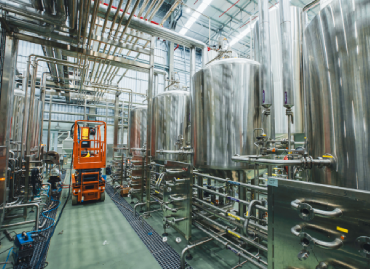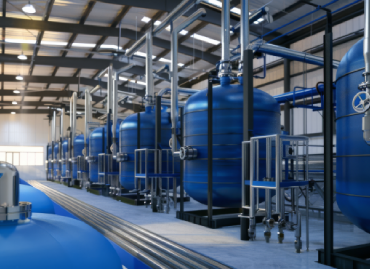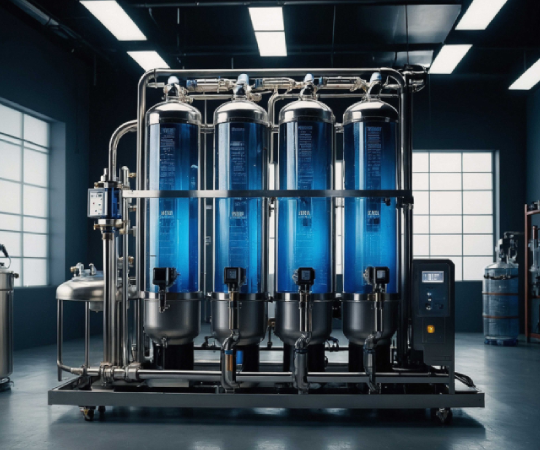- By Admin
- 04 Sep 2025
- ETP Plant
Boiler Feed Industries: Effective Water and Wastewater Management for Enhanced Efficiency and Sustainability
Boiler feed industries in India, especially in Maharashtra, play a crucial role in powering numerous industrial processes, from manufacturing and pharmaceuticals to textiles and power generation. These industries require a constant and reliable supply of high-quality water to generate steam for various operations.
The importance of water treatment in these industries cannot be overstated, as untreated water can lead to inefficiencies such as scaling, corrosion, and energy loss. As industrial zones in Maharashtra grow, the need for advanced water and wastewater treatment systems becomes even more critical to ensure that operations run smoothly and sustainably.
"Water is the cornerstone of industrial productivity. In boiler feed industries, its quality directly influences the lifespan and efficiency of operations. With proper treatment, water becomes an asset, preventing corrosion, scaling, and energy losses. Every drop treated well adds to operational excellence, ensuring sustainability in every process."
High-Quality Water: Essential for Efficient Steam Generation
Water is indispensable to boiler operations. It serves as the feedstock for steam generation, which powers manufacturing processes, cooling systems, and cleaning operations. However, the quality of the feed water directly impacts the performance and lifespan of the boilers. Impurities such as dissolved salts, gases, and minerals can cause scaling within the boiler system. This scaling leads to a reduction in thermal efficiency and increases the risk of corrosion, shortening the boiler's operational life.
Industries rely on a range of water treatment technologies to ensure that the feed water meets stringent quality standards. Reverse Osmosis (RO), Demineralisation (DM), and filtration systems are commonly used to remove harmful substances from the water before it enters the boiler. These technologies ensure that the water is purified to the desired levels, protecting the boiler and improving overall efficiency.


Wastewater Generation in Boiler Feed Industries
The boiler operation cycle produces various forms of wastewater at different stages. Wastewater is generated during pre-treatment processes, such as backwashing filters and dosing chemicals to treat the water. Another significant source of sewage is the blowdown process, where water is periodically drained from the boiler to remove impurities that accumulate in the drum. This blowdown water, which is high in total dissolved solids (TDS), silica, and phosphates, can be highly detrimental to the environment if not treated properly.
Additional wastewater is produced from condensate drainage, chemical cleaning of boilers, and cooling operations. These effluents are often laden with oils, heavy metals, and chemical residues, making them unsuitable for direct discharge into the environment. Each of these wastewater streams presents unique challenges that require specialised treatment methods.
Specialised Treatment for Boiler Feed Wastewater
Boiler feed industries produce complex wastewater that requires a combination of treatment technologies to ensure its safe disposal or reuse. Effluent Treatment Plants (ETPs) are employed to remove suspended solids, oils, and heavy metals from the wastewater. Sewage Treatment Plants (STPs) are often used to manage domestic wastewater from industrial zones.
To tackle more complex wastewater streams, industries turn to advanced systems like membrane filtration, Reverse Osmosis (RO), and Multi-Effect Evaporators (MEE). These systems are designed to recover water at high rates and achieve Zero Liquid Discharge (ZLD) goals, which are becoming a common industry standard. By achieving ZLD, boiler-feed industries can recycle and reuse almost all of their wastewater, reducing their dependence on freshwater sources.
Innovations in Water Treatment for Sustainability
In recent years, there has been a noticeable shift toward sustainability in the boiler feed industry. Many companies are investing in cutting-edge wastewater treatment technologies that allow for the recovery and reuse of water at a higher efficiency. Ultrafiltration (UF), Nanofiltration (NF), and Reverse Osmosis (RO) systems are becoming standard setups for industries aiming to meet high-purity water requirements.
The integration of automation and IoT-enabled systems has further optimised water treatment operations. Real-time monitoring of water quality and treatment processes allows industries to make immediate adjustments, ensuring continuous compliance with regulatory standards. These advancements not only improve operational efficiency but also contribute to reducing environmental impact.
Comprehensive Water Treatment Solutions for Boiler Feed Industries
To help industries meet their water treatment needs, tailored solutions are necessary. Customised systems for treating boiler feed water, managing wastewater, and ensuring proper water reuse are essential. Companies require expert consultation, design, installation, and ongoing maintenance to maintain optimal performance of their water treatment plants.
Our services cater to the unique requirements of boiler feed industries by providing end-to-end solutions, including the design and installation of STPs, ETPs, WTPs, and RO systems. We analyse your operational needs, assess the water quality, and recommend the most effective treatment solutions to ensure compliance, efficiency, and sustainability. In addition to installation, we offer remote monitoring, automated controls, and regular maintenance services. These services ensure that your water treatment plant operates smoothly with minimal manual intervention, thereby reducing downtime and maximising productivity.
Summary And Conclusion
Water and wastewater management are crucial to the success and sustainability of boiler feed industries. Efficient water treatment solutions, such as STPs, ETPs, WTPs, and RO systems, are essential for maintaining the high quality of feed water needed for steam generation. By adopting advanced technologies like Zero Liquid Discharge (ZLD), Ultrafiltration (UF), and Nanofiltration (NF), industries can ensure efficient water reuse, reduce dependence on external freshwater sources, and minimise their environmental footprint. Customised water treatment systems, along with real-time monitoring, help companies maintain operational efficiency while contributing to ecological sustainability.































































